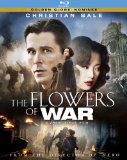| Reviews & Columns |
|
Reviews DVD TV on DVD Blu-ray 4K UHD International DVDs In Theaters Reviews by Studio Video Games Features Collector Series DVDs Easter Egg Database Interviews DVD Talk Radio Feature Articles Columns Anime Talk DVD Savant Horror DVDs The M.O.D. Squad Art House HD Talk Silent DVD
|
DVD Talk Forum |
|
|
| Resources |
|
DVD Price Search Customer Service #'s RCE Info Links |
|
Columns
|
|
|
Flowers of War, The
Lionsgate Home Entertainment // R // July 10, 2012
List Price: $29.99 [Buy now and save at Amazon]
The Film:
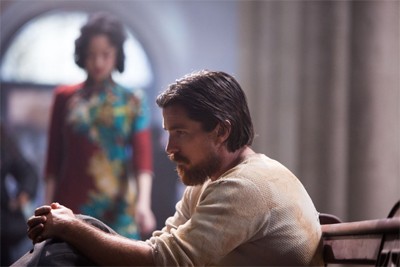 In The Flowers of War, director Zhang Yimou turns his attention to late-1930s China during the Nanjing Massacre: a six-week stretch during the Second Sino-Japanese War, made notorious for the bountiful slaughter and violation of China's populace. The time period between the '20s and '40s, and the diligence of China's people amidst hardship, is familiar to the director given his successes with Raise the Red Lantern and To Live, yet this marks his first concentrated glimpse into the volatility and bloodshed that accompanies warfare. Naturally, this isn't a topic that's easy to watch -- explosions, dilapidation, and fear of a fate worse than death -- and it's difficult for beauty to emerge from those conditions. With his visually robust aesthetic and persuasive dramatic perspective in-tow, director Zhang shoulders the challenge and takes the audience into a situation that finds intimate, fraught beauty within the hopeless bunkered strain of war, one that successfully trundles between schmaltz and deep-rooted historical drama in its tale of hope.
In The Flowers of War, director Zhang Yimou turns his attention to late-1930s China during the Nanjing Massacre: a six-week stretch during the Second Sino-Japanese War, made notorious for the bountiful slaughter and violation of China's populace. The time period between the '20s and '40s, and the diligence of China's people amidst hardship, is familiar to the director given his successes with Raise the Red Lantern and To Live, yet this marks his first concentrated glimpse into the volatility and bloodshed that accompanies warfare. Naturally, this isn't a topic that's easy to watch -- explosions, dilapidation, and fear of a fate worse than death -- and it's difficult for beauty to emerge from those conditions. With his visually robust aesthetic and persuasive dramatic perspective in-tow, director Zhang shoulders the challenge and takes the audience into a situation that finds intimate, fraught beauty within the hopeless bunkered strain of war, one that successfully trundles between schmaltz and deep-rooted historical drama in its tale of hope.
Roughly based on the novella "13 Flowers of Nanjing" by Geling Yan, Zhang Yimou tells the story of an American mortician, John Miller (Christian Bale), who's been sent to prepare a deceased priest in 1937 war-ravaged Nanjing. He discovers, upon his arrival at the church, a group of twelve young Chinese girls holed up there with little money, less food, and no way of defending themselves if the Japanese arrive -- save the unaware soldiers fighting outside their walls. Miller, a prickly drunkard with a loud mouth, doesn't adhere to heroism as a natural trait, yet he's compelled to stick around when a large group of needy prostitutes (notably their "matriarch", the disarming Yu Mo (Ni Ni)) force their way into the church's doors for sanctuary. As the battle outside slowly makes its way into the church's gothic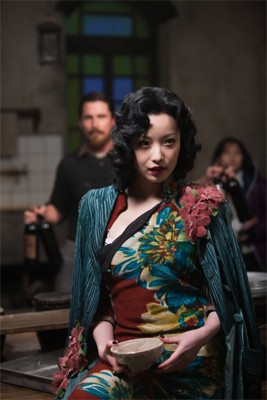 walls, complete with wildly-flying bullets and wall-rattling explosions, they all realize that they've got to find a way to escape if they're going to survive, because the crumbling stony foundation won't keep them safe for long. And Miller, the somewhat-immune American, is the key.
walls, complete with wildly-flying bullets and wall-rattling explosions, they all realize that they've got to find a way to escape if they're going to survive, because the crumbling stony foundation won't keep them safe for long. And Miller, the somewhat-immune American, is the key.
Director Zhang utilizes his signature visual-heavy style as he guides our perspective through the war-torn streets of Nanjing, accentuating slow-motion camerawork and punchy violence with a skilled eye for exhilarating sequences. The Flowers of War begins as you'd expect from the director of Hero and House of Flying Daggers: powdered ash creates a unique visual spectacle among bloody bayonets and popped guitar strings, while the densely-textured environment employs broad, abstract use of the production's robust budget (the highest in China's history). But it's not all smoke and mirrors to cloud the story; it showcases intention, in military storms through the streets and vigorous gunfire sequences, behind conveying the traumatic brutality that exists outside the church's walls. When these bullets shatter the stained glass of the monastery's few outlook points in disarming displays, the same places where the children view the violence outside, it's clear that the director isn't merely creating visual flourishes for the sake of artful confection.
Visual magnetism makes The Flowers of War far more palatable than that of a purely hardnosed outlook on its historical context, hitting evocative peaks and valleys as the material digs deeper into the volatile themes and displays accompanying a topic like the Nanjing Massacre. In combination with the script from Liu Heng (The Story of Qiu Ju, Assembly), it doesn't shy away from the content and implications, instead framing scenes of rape, death, and desperation with a cautious, arty eye that eases some of the pain. Heng's dialogue surrounding these sequences is deftly realized; the language remains frank and intelligent, nimbly revealing portions of the characters' internal contemplations and plot movement, yet it also permits blatant symbolic context to mix with the drama in Miller's mediation of the church's sorted women.
Christian Bale keeps the momentum moving as John Miller, who ends up being a more curious character than expected. It'd be easy to dismiss him as a generic white-faced American entity who finds redemption outside the comforts of home, but there's more to the roguish mortician than that. It's no great surprise or spoiler that the man exhibits a transformation under the church's roof; spending time amidst the sultry presence of the prostitutes and the righteous tempering of the girls, both camps equally defenseless, reshapes his persona from a boozed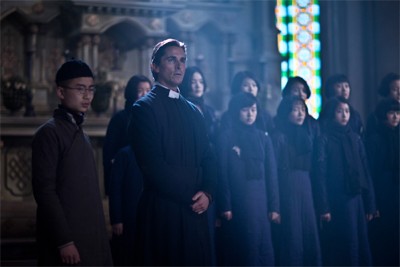 up mortician to a righteous man posing as a priest. His transition becomes an earnest one, mixing flickers of his persona in The Fighter with the composure of a man who's suffered great loss, which sharpen the edge on scenes where he demands money from the church and propositions a prostitute. There are scenes where he's overtly vivacious early on, and the comparison of his character before and after the events in the church seems stark, but there's validity in his dramatic poise that sells Miller's transformation.
up mortician to a righteous man posing as a priest. His transition becomes an earnest one, mixing flickers of his persona in The Fighter with the composure of a man who's suffered great loss, which sharpen the edge on scenes where he demands money from the church and propositions a prostitute. There are scenes where he's overtly vivacious early on, and the comparison of his character before and after the events in the church seems stark, but there's validity in his dramatic poise that sells Miller's transformation.
No matter how well-written the characters and scenario are, though, and no matter how exquisite the cast of Chinese locals fills out its dramatic force, The Flowers of War's dependence on ham-fisted plot contrivances keeps the work out-of-reach from greatness. It conveniently grasps onto the importance of Miller's past profession and the dichotomy between the younger girls and older women, and as it approaches its harrowing conclusion -- one with cathartic, well-meaning overtones of redemption and perseverance -- certain plot developments cannot help from appearing as heavy-handed machinations, engineered to rouse heavy-chested emotion. Despite that, it still works; while there's something undeniably forced about its structure, there's power in the genuine performances, the scenario's immediacy, and the briskly-moving emotional tempo that earn forgiveness for manipulative tactics. Zhang knows how to find the beauty within his tales of resilience in the face of insurmountable odds, and his intimate depiction of a scenario inside the Nanjing Massacre is no different.
The Blu-ray:
Video and Audio:
Mercy. Talk about a high-def experience.
Look, it doesn't take much searching or exposure to realize that Zhang Yimou's work -- especially over the past ten years, no matter the dramatic merit -- has been one visual tour-de-force after another, with lots of palette flourishes and graceful movements through striking scenes. When that's coupled with a big-budget production, up-to-date cameras, and a smattering of gray-leaning textures and vibrant colors, The Flowers of War holds the potential to be an intense experience in HD. Lionsgate delivers on that promise: the 1080p AVC treatment of its 2.39:1-framed cinematography captures the dominant, filthy grays-'n-browns of war to equal successes as the measured usage of lush concubine costumes, warm lighting, and stained-glass windows. Close-ups yield exquisite facial and textile textures, not to mention fine shadow detail and skin-tone gradation, while the vigorous motion through the battlefield never fails to aptly capture dense texture -- powdered ash, decimated stone, trickles of blood, and wound guitar string -- where needed. This is an exquisite, disarming Blu-ray experience.
The visual treatment is outstanding; however, the 7-channel DTS-HD Master Audio track approaches the spectrum of reference-level quality, an exemplary aural experience among the war-time ferocity and intimate close-quartered sequences that trumps even the stunning photography. While its successes can be heard throughout the production, these strengths stand front-and-center even in the first ten minutes: the storm through the ash-covered, dilapidated streets of a recreated Nanjing fill the sound stage with furiously whizzing bullets and space-filling military vigor, stretching from the rear-channels and ever-so-gracefully rushing to the front -- and vice-versa. Explosions, which there are quite a few, rock the low-end foundation, especially once scattered hand grenades ignite. As a war film, it offers noteworthy fistfuls of accomplishment, yet the subtle activity -- the velvety treatment of dialogue, the pluck of guitar strings, the echoing sound of a female chorus, and the light ambience of near-silence -- is what compliments the aggression to a point that elevates Lionsgate's track to a level that's essentially faultless.
If there's a fault to be found in the "audio" department, it's in the subtitles. Not the grammar, mind you; everything at-play in the text gets the job done, and well. The speed of the transitions creates a problem: I consider myself to be a fairly expedient subtitle reader, partially due to conditioning with discs from overseas, and the dialogue shifts still seemed somewhat on the quick side. It's not to a point that's worth any concern, but it would've been beneficial for the text to appear on-screen for just a tad bit longer.
Special Features:
The Birth of Flowers of War (21:08, HD):
The initial segment of the featurettes is a brisk affair that doesn't linger on a subject for very long. In fact, it's a little too scattered and cursory for its own good. Offering glimpses into behind-the-scenes content, this one works better as a quick-cut mosaic of the assembly process than an in-depth exploration. You'll see intriguing elements, like fact-checking on a gun and a quick look at concubine dance training; but just as they get interesting, the camera moves towards another subject. On top of that, it lingers a little too long on subjects that could have been covered in one of these brief snippets, such as the grief the young girls experience when they're forced to cut their hair. This starting point featurette could've been better.
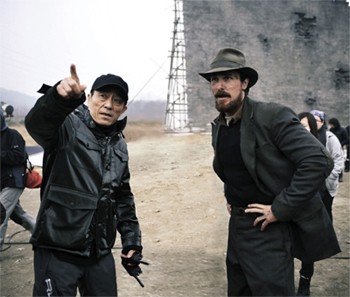 Meeting Christian Bale (16:20, HD):
Meeting Christian Bale (16:20, HD):
It takes a few minutes before actually getting to the Christian Bale portion of this material, but once it does, the dynamic expressed between the actor and Zhang Yimou proves to be an intriguing one. This piece reveals that Bale played a key part in making the dialogue natural, and that he and the director shared a lot of the same viewpoints on elements that feel natural in the story's context. You get to see how the translator dynamic works on-set in these pieces, how Bale rarely shoots the same scene the same way twice, and how he interacted with the other actors on-set.
The Newborn Stars (22:16, HD):
Here, the content gets a little more focused in what it's exploring, namely in how Zhang Yimou directed the young, new actresses operated on a film set -- most for the first time. Starting with the actresses whom play the prostitutes and then feeding into the young girls of the church, they go over specific scenes (one in particular that caught my eye was some work in front of a green screen during a foot chase), as well as their methods and dealing with language barriers. The dialogue gets a little redundant as they discuss the director and their processes, but the behind-the-scenes footage and how they play into the context of their dialogue makes it worth the time.
Hard Time During War (20:08, HD):
While I've been a little critical of the quickly-cut nature of the previous segments, it actually isn't that distracting when this segment examines the production components of recreating war-torn China. Occasionally humorous and fascinating to watch when flipping between Zhang's quick direction and orchestrating explosions/action sequence, this piece covers a lot of ground in a small amount of time. It knows when to linger on a subject, such as navigating a tank within a set and orchestrating the point when it rams into a structure, and it reveals certain points when accidents occur -- such as when a wall collapses before it's supposed to.
Perfection of Light and Color (13:55, HD):
Anyone who knows of Zhang Yimou's work knows that he's very precise when it comes to cinematography, lighting, and the palette he achieves, and this great fourteen-minute piece explores the ways in which the production crew diligently works towards achieving the vision their director has in mind. From nailing down a certain shade of blue to grasping the proper transparency in windows and the natural shape of a hole through shattered stained glass, it's a fine exploration of his attention to detail. And, on top of that, as the material has proceeded through these "episodes" in the behind-the-scenes material, they's approached a clearer focus and less-jittery movement through the topics. This one, which will probably end up being the most fascinating one to photographers, ends up being the best because of it.
Outside of the behind-the-scenes features, the only things we've got left is the fantastic Theatrical Trailer (2:33, HD) that originally reinforced my excitement over Zhang Yimou's latest project.
Final Thoughts:
After a peculiarly intriguing but ultimately unsuccessful outing with his remake of a Coen Bros. film, Zhang Yimou return to form in his recent historical epic, The Flowers of War. His signature painterly eye elevates a story that takes place amid the Nanjing Massacre -- adapted from a novella that's based on true events -- into one that's mesmerizing to watch for the drama and the visual captivation, both readily present in this recount of John Miller's attempt to rescue the righteous girls and lush women of this Nanjing monastery. For its 140+ minutes, it remains well-paced and emotionally engaging as it explores the themes of innocence and redemption amid the harshness of the Second Sino-Japanese war, and barring some storytelling contrivances and overly-teary performances, it's a compelling piece from the storied Chinese director. This isn't the director's best work, but it's certainly worthy of his name and evocative in more ways than one, a flawed but splendid gem of war-drama cinema.
The Flowers of War itself comes with, at the very least, a hearty recommendation, even consider the fact that most harrowing war movies typically outlive their stay after a viewing or two; however, this is an exquisite Blu-ray from Lionsgate in terms of audiovisual prowess, boasting outstanding visuals and a occasionally thunderous, completely fluent 7-channel Master Audio track, and the behind-the-scenes features ain't too shabby either. Highly Recommended.
Thomas Spurlin, Staff Reviewer -- DVDTalk Reviews | Personal Blog/Site
 In The Flowers of War, director Zhang Yimou turns his attention to late-1930s China during the Nanjing Massacre: a six-week stretch during the Second Sino-Japanese War, made notorious for the bountiful slaughter and violation of China's populace. The time period between the '20s and '40s, and the diligence of China's people amidst hardship, is familiar to the director given his successes with Raise the Red Lantern and To Live, yet this marks his first concentrated glimpse into the volatility and bloodshed that accompanies warfare. Naturally, this isn't a topic that's easy to watch -- explosions, dilapidation, and fear of a fate worse than death -- and it's difficult for beauty to emerge from those conditions. With his visually robust aesthetic and persuasive dramatic perspective in-tow, director Zhang shoulders the challenge and takes the audience into a situation that finds intimate, fraught beauty within the hopeless bunkered strain of war, one that successfully trundles between schmaltz and deep-rooted historical drama in its tale of hope.
In The Flowers of War, director Zhang Yimou turns his attention to late-1930s China during the Nanjing Massacre: a six-week stretch during the Second Sino-Japanese War, made notorious for the bountiful slaughter and violation of China's populace. The time period between the '20s and '40s, and the diligence of China's people amidst hardship, is familiar to the director given his successes with Raise the Red Lantern and To Live, yet this marks his first concentrated glimpse into the volatility and bloodshed that accompanies warfare. Naturally, this isn't a topic that's easy to watch -- explosions, dilapidation, and fear of a fate worse than death -- and it's difficult for beauty to emerge from those conditions. With his visually robust aesthetic and persuasive dramatic perspective in-tow, director Zhang shoulders the challenge and takes the audience into a situation that finds intimate, fraught beauty within the hopeless bunkered strain of war, one that successfully trundles between schmaltz and deep-rooted historical drama in its tale of hope. Roughly based on the novella "13 Flowers of Nanjing" by Geling Yan, Zhang Yimou tells the story of an American mortician, John Miller (Christian Bale), who's been sent to prepare a deceased priest in 1937 war-ravaged Nanjing. He discovers, upon his arrival at the church, a group of twelve young Chinese girls holed up there with little money, less food, and no way of defending themselves if the Japanese arrive -- save the unaware soldiers fighting outside their walls. Miller, a prickly drunkard with a loud mouth, doesn't adhere to heroism as a natural trait, yet he's compelled to stick around when a large group of needy prostitutes (notably their "matriarch", the disarming Yu Mo (Ni Ni)) force their way into the church's doors for sanctuary. As the battle outside slowly makes its way into the church's gothic
 walls, complete with wildly-flying bullets and wall-rattling explosions, they all realize that they've got to find a way to escape if they're going to survive, because the crumbling stony foundation won't keep them safe for long. And Miller, the somewhat-immune American, is the key.
walls, complete with wildly-flying bullets and wall-rattling explosions, they all realize that they've got to find a way to escape if they're going to survive, because the crumbling stony foundation won't keep them safe for long. And Miller, the somewhat-immune American, is the key. Director Zhang utilizes his signature visual-heavy style as he guides our perspective through the war-torn streets of Nanjing, accentuating slow-motion camerawork and punchy violence with a skilled eye for exhilarating sequences. The Flowers of War begins as you'd expect from the director of Hero and House of Flying Daggers: powdered ash creates a unique visual spectacle among bloody bayonets and popped guitar strings, while the densely-textured environment employs broad, abstract use of the production's robust budget (the highest in China's history). But it's not all smoke and mirrors to cloud the story; it showcases intention, in military storms through the streets and vigorous gunfire sequences, behind conveying the traumatic brutality that exists outside the church's walls. When these bullets shatter the stained glass of the monastery's few outlook points in disarming displays, the same places where the children view the violence outside, it's clear that the director isn't merely creating visual flourishes for the sake of artful confection.
Visual magnetism makes The Flowers of War far more palatable than that of a purely hardnosed outlook on its historical context, hitting evocative peaks and valleys as the material digs deeper into the volatile themes and displays accompanying a topic like the Nanjing Massacre. In combination with the script from Liu Heng (The Story of Qiu Ju, Assembly), it doesn't shy away from the content and implications, instead framing scenes of rape, death, and desperation with a cautious, arty eye that eases some of the pain. Heng's dialogue surrounding these sequences is deftly realized; the language remains frank and intelligent, nimbly revealing portions of the characters' internal contemplations and plot movement, yet it also permits blatant symbolic context to mix with the drama in Miller's mediation of the church's sorted women.
Christian Bale keeps the momentum moving as John Miller, who ends up being a more curious character than expected. It'd be easy to dismiss him as a generic white-faced American entity who finds redemption outside the comforts of home, but there's more to the roguish mortician than that. It's no great surprise or spoiler that the man exhibits a transformation under the church's roof; spending time amidst the sultry presence of the prostitutes and the righteous tempering of the girls, both camps equally defenseless, reshapes his persona from a boozed
 up mortician to a righteous man posing as a priest. His transition becomes an earnest one, mixing flickers of his persona in The Fighter with the composure of a man who's suffered great loss, which sharpen the edge on scenes where he demands money from the church and propositions a prostitute. There are scenes where he's overtly vivacious early on, and the comparison of his character before and after the events in the church seems stark, but there's validity in his dramatic poise that sells Miller's transformation.
up mortician to a righteous man posing as a priest. His transition becomes an earnest one, mixing flickers of his persona in The Fighter with the composure of a man who's suffered great loss, which sharpen the edge on scenes where he demands money from the church and propositions a prostitute. There are scenes where he's overtly vivacious early on, and the comparison of his character before and after the events in the church seems stark, but there's validity in his dramatic poise that sells Miller's transformation. No matter how well-written the characters and scenario are, though, and no matter how exquisite the cast of Chinese locals fills out its dramatic force, The Flowers of War's dependence on ham-fisted plot contrivances keeps the work out-of-reach from greatness. It conveniently grasps onto the importance of Miller's past profession and the dichotomy between the younger girls and older women, and as it approaches its harrowing conclusion -- one with cathartic, well-meaning overtones of redemption and perseverance -- certain plot developments cannot help from appearing as heavy-handed machinations, engineered to rouse heavy-chested emotion. Despite that, it still works; while there's something undeniably forced about its structure, there's power in the genuine performances, the scenario's immediacy, and the briskly-moving emotional tempo that earn forgiveness for manipulative tactics. Zhang knows how to find the beauty within his tales of resilience in the face of insurmountable odds, and his intimate depiction of a scenario inside the Nanjing Massacre is no different.
The Blu-ray:
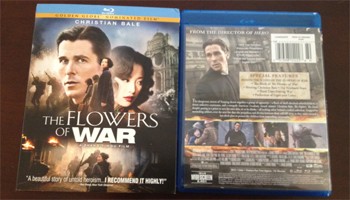 | 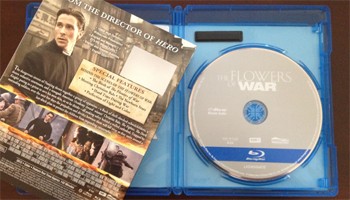 |
Video and Audio:
Mercy. Talk about a high-def experience.
Look, it doesn't take much searching or exposure to realize that Zhang Yimou's work -- especially over the past ten years, no matter the dramatic merit -- has been one visual tour-de-force after another, with lots of palette flourishes and graceful movements through striking scenes. When that's coupled with a big-budget production, up-to-date cameras, and a smattering of gray-leaning textures and vibrant colors, The Flowers of War holds the potential to be an intense experience in HD. Lionsgate delivers on that promise: the 1080p AVC treatment of its 2.39:1-framed cinematography captures the dominant, filthy grays-'n-browns of war to equal successes as the measured usage of lush concubine costumes, warm lighting, and stained-glass windows. Close-ups yield exquisite facial and textile textures, not to mention fine shadow detail and skin-tone gradation, while the vigorous motion through the battlefield never fails to aptly capture dense texture -- powdered ash, decimated stone, trickles of blood, and wound guitar string -- where needed. This is an exquisite, disarming Blu-ray experience.
The visual treatment is outstanding; however, the 7-channel DTS-HD Master Audio track approaches the spectrum of reference-level quality, an exemplary aural experience among the war-time ferocity and intimate close-quartered sequences that trumps even the stunning photography. While its successes can be heard throughout the production, these strengths stand front-and-center even in the first ten minutes: the storm through the ash-covered, dilapidated streets of a recreated Nanjing fill the sound stage with furiously whizzing bullets and space-filling military vigor, stretching from the rear-channels and ever-so-gracefully rushing to the front -- and vice-versa. Explosions, which there are quite a few, rock the low-end foundation, especially once scattered hand grenades ignite. As a war film, it offers noteworthy fistfuls of accomplishment, yet the subtle activity -- the velvety treatment of dialogue, the pluck of guitar strings, the echoing sound of a female chorus, and the light ambience of near-silence -- is what compliments the aggression to a point that elevates Lionsgate's track to a level that's essentially faultless.
If there's a fault to be found in the "audio" department, it's in the subtitles. Not the grammar, mind you; everything at-play in the text gets the job done, and well. The speed of the transitions creates a problem: I consider myself to be a fairly expedient subtitle reader, partially due to conditioning with discs from overseas, and the dialogue shifts still seemed somewhat on the quick side. It's not to a point that's worth any concern, but it would've been beneficial for the text to appear on-screen for just a tad bit longer.
Special Features:
The Birth of Flowers of War (21:08, HD):
The initial segment of the featurettes is a brisk affair that doesn't linger on a subject for very long. In fact, it's a little too scattered and cursory for its own good. Offering glimpses into behind-the-scenes content, this one works better as a quick-cut mosaic of the assembly process than an in-depth exploration. You'll see intriguing elements, like fact-checking on a gun and a quick look at concubine dance training; but just as they get interesting, the camera moves towards another subject. On top of that, it lingers a little too long on subjects that could have been covered in one of these brief snippets, such as the grief the young girls experience when they're forced to cut their hair. This starting point featurette could've been better.
 Meeting Christian Bale (16:20, HD):
Meeting Christian Bale (16:20, HD): It takes a few minutes before actually getting to the Christian Bale portion of this material, but once it does, the dynamic expressed between the actor and Zhang Yimou proves to be an intriguing one. This piece reveals that Bale played a key part in making the dialogue natural, and that he and the director shared a lot of the same viewpoints on elements that feel natural in the story's context. You get to see how the translator dynamic works on-set in these pieces, how Bale rarely shoots the same scene the same way twice, and how he interacted with the other actors on-set.
The Newborn Stars (22:16, HD):
Here, the content gets a little more focused in what it's exploring, namely in how Zhang Yimou directed the young, new actresses operated on a film set -- most for the first time. Starting with the actresses whom play the prostitutes and then feeding into the young girls of the church, they go over specific scenes (one in particular that caught my eye was some work in front of a green screen during a foot chase), as well as their methods and dealing with language barriers. The dialogue gets a little redundant as they discuss the director and their processes, but the behind-the-scenes footage and how they play into the context of their dialogue makes it worth the time.
Hard Time During War (20:08, HD):
While I've been a little critical of the quickly-cut nature of the previous segments, it actually isn't that distracting when this segment examines the production components of recreating war-torn China. Occasionally humorous and fascinating to watch when flipping between Zhang's quick direction and orchestrating explosions/action sequence, this piece covers a lot of ground in a small amount of time. It knows when to linger on a subject, such as navigating a tank within a set and orchestrating the point when it rams into a structure, and it reveals certain points when accidents occur -- such as when a wall collapses before it's supposed to.
Perfection of Light and Color (13:55, HD):
Anyone who knows of Zhang Yimou's work knows that he's very precise when it comes to cinematography, lighting, and the palette he achieves, and this great fourteen-minute piece explores the ways in which the production crew diligently works towards achieving the vision their director has in mind. From nailing down a certain shade of blue to grasping the proper transparency in windows and the natural shape of a hole through shattered stained glass, it's a fine exploration of his attention to detail. And, on top of that, as the material has proceeded through these "episodes" in the behind-the-scenes material, they's approached a clearer focus and less-jittery movement through the topics. This one, which will probably end up being the most fascinating one to photographers, ends up being the best because of it.
Outside of the behind-the-scenes features, the only things we've got left is the fantastic Theatrical Trailer (2:33, HD) that originally reinforced my excitement over Zhang Yimou's latest project.
Final Thoughts:
After a peculiarly intriguing but ultimately unsuccessful outing with his remake of a Coen Bros. film, Zhang Yimou return to form in his recent historical epic, The Flowers of War. His signature painterly eye elevates a story that takes place amid the Nanjing Massacre -- adapted from a novella that's based on true events -- into one that's mesmerizing to watch for the drama and the visual captivation, both readily present in this recount of John Miller's attempt to rescue the righteous girls and lush women of this Nanjing monastery. For its 140+ minutes, it remains well-paced and emotionally engaging as it explores the themes of innocence and redemption amid the harshness of the Second Sino-Japanese war, and barring some storytelling contrivances and overly-teary performances, it's a compelling piece from the storied Chinese director. This isn't the director's best work, but it's certainly worthy of his name and evocative in more ways than one, a flawed but splendid gem of war-drama cinema.
The Flowers of War itself comes with, at the very least, a hearty recommendation, even consider the fact that most harrowing war movies typically outlive their stay after a viewing or two; however, this is an exquisite Blu-ray from Lionsgate in terms of audiovisual prowess, boasting outstanding visuals and a occasionally thunderous, completely fluent 7-channel Master Audio track, and the behind-the-scenes features ain't too shabby either. Highly Recommended.
|
| Popular Reviews |
| Sponsored Links |
|
|
| Sponsored Links |
|
|
| Release List | Reviews | Shop | Newsletter | Forum | DVD Giveaways | Blu-Ray | Advertise |
|
Copyright 2024 DVDTalk.com All Rights Reserved. Legal Info, Privacy Policy, Terms of Use,
Manage Preferences,
Your Privacy Choices | |||||||









